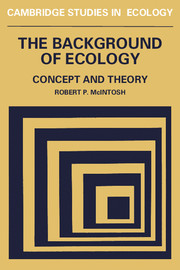Book contents
- Frontmatter
- Contents
- Preface
- Acknowledgments
- 1 Antecedents of ecology
- 2 The crystallization of ecology
- 3 Dynamic ecology
- 4 Quantitative community ecology
- 5 Population ecology
- 6 Ecosystem ecology, systems ecology, and big biology
- 7 Theoretical approaches to ecology
- 8 Ecology and environment
- References
- Name index
- Subject index
3 - Dynamic ecology
Published online by Cambridge University Press: 05 August 2012
- Frontmatter
- Contents
- Preface
- Acknowledgments
- 1 Antecedents of ecology
- 2 The crystallization of ecology
- 3 Dynamic ecology
- 4 Quantitative community ecology
- 5 Population ecology
- 6 Ecosystem ecology, systems ecology, and big biology
- 7 Theoretical approaches to ecology
- 8 Ecology and environment
- References
- Name index
- Subject index
Summary
The 18th century produced at least the beginning of a change in natural history from a view of nature as a divinely ordered, essentially static system following a providential mandate to a dynamic “historically changing” entity endowed with “self-activating” and “self-realizing” powers (Lyon and Sloan 1981). This conception of natural history persisted in the early 19th century in “Humboldtian science” (Cannon 1978). Its canon of “accurate measured study of widespread but interconnected phenomena . . . to find a definite law and a dynamical cause” was continued by the rising science of ecology in the late 19th century. A major theme of functional, experimental biology as it developed in the 19th century was its emphasis on progressive change as the most significant characteristic of natural phenomena (Coleman 1977). Whether ecology is seen as emerging from 18th- or 19th-century natural history, from 19th-century mechanistic physiology, or some amalgam of these, the conception sometimes encountered of early self-conscious ecology as descending from and embodying a static, typological, descriptive progenitor needs to be reconsidered. Certainly in the view of most of its early proponents and practitioners, the key word for ecology was dynamic. This was explicit in the writings of the leading figures of ecology as it became a self-conscious science. If they or lesser ecologists failed immediately to emphasize all of the ideas that later came to typify the “new” dynamic or functional ecology, it should not be assumed that first-generation ecologists were content with description as the aim of ecology.
- Type
- Chapter
- Information
- The Background of EcologyConcept and Theory, pp. 69 - 106Publisher: Cambridge University PressPrint publication year: 1985
- 1
- Cited by

